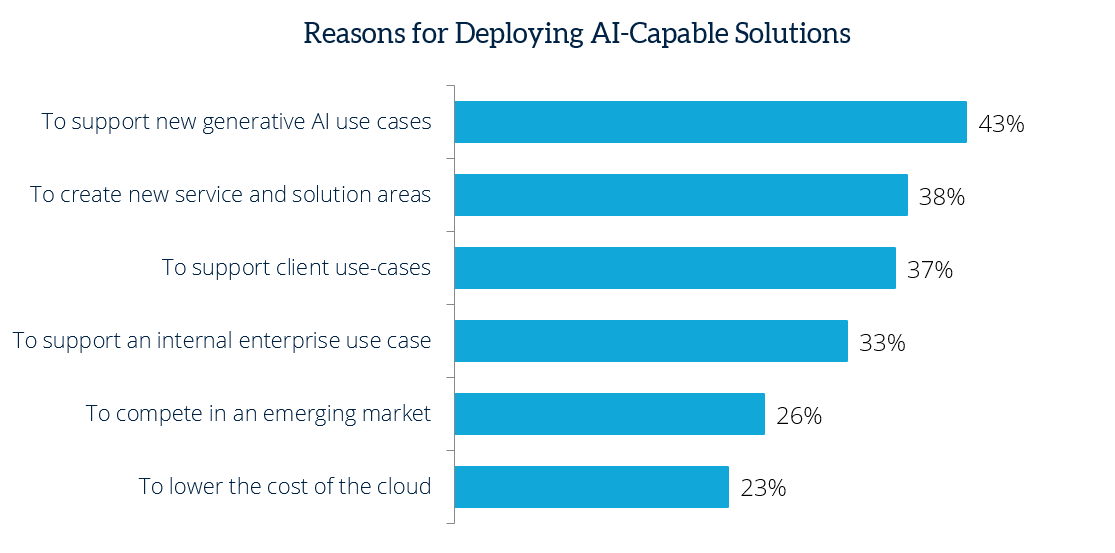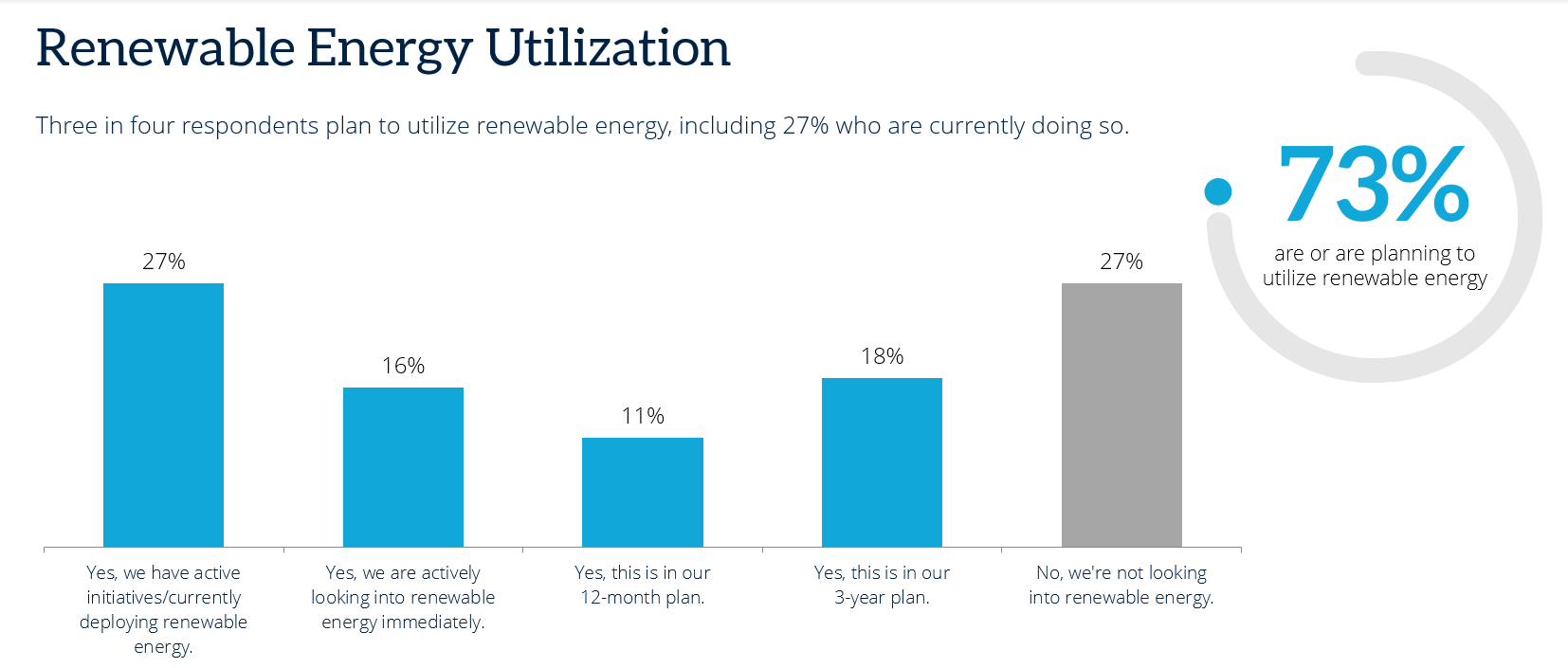Rapid growth in the artificial intelligence and wider digital services industries is fueling demand for new data center developments while stimulating innovation in the field of data center design and technical innovation, according to AFCOM’s latest State of the Data Center Report.
Published today, the eighth edition of AFCOM’s annual study offers a snapshot of an industry that is at once experiencing a “massive boom in infrastructure design and construction” but also facing a growing list of challenges in key areas such as energy, cooling, and sustainability.
“This year, we delve into the intricacies of GPUs, the explosive growth of the data center sector, and, particularly, the adoption of AI solutions,” said Bill Kleyman, program chair for AFCOM’s Data Center World event and co-author of the report.
“A significant majority of respondents are gearing up to integrate AI-capable solutions into their data centers. The primary driver? An overwhelming interest in supporting the newest wave of generative AI applications.”

Construction Boom
According to the 2024 State of the Data Center Report, the rise of AI is “significantly influencing data center design and infrastructure.” This change is being driven by hyperscalers – including Google, Meta, and Amazon – that are adapting to accommodate higher rack load requirements to support AI workloads and compute demands.
More than half (53%) of those surveyed as part of the report said they believe new AI workloads will “definitely increase capacity requirements” for the colocation industry. Regarding AI solutions, 56% of respondents said they were planning to deploy AI-capable solutions in their own data centers, most commonly to support generative AI use cases (43%).
Citing the latest S&P Global study, which indicates there are nearly 10,000 colocation and wholesale data center facilities in operation globally, AFCOM said the findings “collectively suggest a robust and expanding landscape for data centers.” In addition to AI, growth in secondary markets and increased demand for high-density colocation services are also driving new developments, the association said.
These bullish sentiments were echoed by Dell’Oro Group analyst Baron Fung, who told Data Center Knowledge: “We expect new data center space will need to be added for years to come. Already, the hyperscale cloud and colocation service providers are in a race to build newer and more facilities globally.”
“New data centers will need to be built from the ground up (rather than retrofitted) to be AI-ready, as the infrastructure has unique cooling and power requirements.”
Thirst For Data
AFCOM’s anticipated growth in the data center industry was reflected in a recent study by Gartner, which predicts that worldwide IT spending will total $5 trillion in 2024, an increase of 6.8% from 2023. Spending on data center services is expected to grow by 7.5% to $261 million in the same period.
Gartner analyst John-David Lovelock said: “Enterprises continue to find more uses for technology. IT has moved out of the back office, through the front office, and is now revenue-producing. Until there is a plateau for how and where technology can be used in an enterprise, there cannot be a plateau in enterprise IT spending.”
With data centers forming the backbone of enterprise IT infrastructure, this anticipated increase in demand is being felt by those on the front line of data center construction and operations.
“AI will continue to fuel data center growth in the European data center industry,” Oliver Menzel, CEO of Maincubes, a European data center operator, told Data Center Knowledge. “We also see it being a catalyst to overcoming the challenges (e.g. economy, supply chain, availability of land and power, local regulations) it presents by enabling innovation.”
New Innovations: Sustainability and Modularity
The need for new data centers is not without its challenges. Power and cooling constraints, infrastructure threats, supply chain challenges, and the overarching need to improve sustainability across the industry were all cited as core issues impacting the data center space in 2024.
“Our sector’s expansion and critical role, along with its substantial energy needs, have necessitated a heightened emphasis on sustainable practices and the exploration of renewable energy sources,” the report states. “Three in four respondents (72%) plan to utilize renewable energy, including 27% who are currently doing so.”

Data center infrastructure management (DCIM) and the increased adoption of modular data centers were also identified as key industry trends to watch out for over the coming 12 months.
According to AFCOM, 42% of respondents indicated that a hybrid approach to data center construction – using prefabricated modular facilities alongside traditional building techniques – was on their radar.
“Diving deeper into prefabricated data center designs, we were curious to learn which part would be prefabricated and delivered. Respondents planning to leverage prefabrication in new data center builds are most likely to report exploring prefabricated power modules (78%) and prefabricated cooling modules (72%),” the report said.
Indeed, the AFCOM report comes as analysts are increasingly citing modularity as a core trend in the industry.
“Prefabricated data centers can already shorten build time by 40-80%,” Omdia analyst Vladimir Galabov told Data Center Knowledge last year. “It’s time to open our minds and embrace this solution which can reduce a data center building’s carbon footprint by two-thirds.”
‘A Monumental Shift’
Amid the growing list of challenges, the increased demand for AI has made a positive impact on the industry overall, according to Menzel.
“AI also holds promise in optimizing overall data center operations, enhancing energy efficiency, and strengthening data security through innovative AI tools and applications, the Maincubes CEO said. “For instance, AI could aid in predicting workload demands and automating the distribution of physical and virtual resources.
“Data center operators, infrastructure experts, and policymakers at the community, national, and international levels are collaborating on sustainable energy solutions.”
For Kleyman, AFCOM’s latest industry report comes as data center operators find themselves at the “forefront of a monumental shift.”
“With forecasts indicating that applications based on Large Language Models will be as ubiquitous as web applications within the next half-decade, the industry is at a pivotal juncture,” Kleyman told Data Center Knowledge. “Yet, the narrative doesn't end with AI. Our comprehensive report goes beyond to unravel the complexities underpinning these emerging trends.”
He added: “We are at the cusp of crafting a digital era like no other. In this journey, challenges are inevitable, and barriers are meant to be broken. In this rapidly evolving landscape, there is very little tolerance for complacency. Embrace experimentation with new technologies; they could revolutionize your business and user experience.”
Visit the AFCOM website to read the 2024 State of the Data Center Report.





